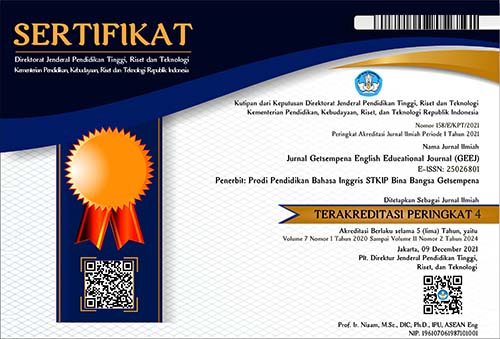APPLICATION OF THE INSIDE OUTSIDE CIRCLE COOPERATIVE LEARNING MODEL TO THE PYTHAGOREAN THEOREM M ATERIAL OF SMP NEGERI 13 BANDA ACEH STUDENTS
Abstract
The purpose of this study is to determine the Implementation of the Inside Outside Circle Cooperative Learning Model on Pythagorean Theorem Material for Students of SMP Negeri 13 Banda Aceh. The method used in this study is a quasi-experimental research method. The research design used was one group pre test-post test design. This research was conducted at SMP Negeri 13 Banda Aceh and was carried out on December 11, 2023 in class VIII in the odd semester of the 2022/2023 academic year. The population in this study was all 31 students of Class VIII SMP Negeri 13 Banda Aceh. While the sample is class VIII-5 consisting of 31 students. Most students obtained grades greater than or equal to KKM scores, with an average score of 87.56. From the analysis of the t test, it was calculated that it was 3.82 greater than the table t. This shows that the Inside Outside Circle model affects the learning outcomes of Pythagorean Theorem material for grade VIII students of SMPN 13 Banda Aceh. The implementation of the Inside Outside Circle Cooperative Learning Model on the Pythagorean Theorem material grade VIII SMPN 13 Banda Aceh achieved maximum learning completeness. This model is very good to be applied to the teaching and learning process, because it can stimulate students to concentrate on the material being studied
References
Ayuni, N., Maryana, M., Marhami, M., Nufus, H., & Mursalin, M. (2021). Peningkatan Kemampuan Penalaran Matematis Siswa Melalui Model Pembelajaran Problem Posing Berbantuan Software Autograph Pada Siswa Mtss Al-Madinatuddiniyah Syamsuddhuha. Jurnal Pendidikan Matematika Malikussaleh, 1(2), 65-74. https://doi.org/10.29103/jpmm.v1i2.5588
Corsi, G. (2020). ‘Education has no end’: Reconciling past and future through reforms in the education system. Educational Philosophy and Theory, 52(6), 688–697. https://doi.org/10.1080/00131857.2019.1707658
Darmaji, D., Kurniawan, D. A., & Irdianti, I. (2019). Physics education students’ science process skills. International Journal of Evaluation and Research in Education, 8(2), 293–298. https://doi.org/10.11591/ijere.v8i2.28646
Flores-Tena, M. J. (2020). The Educational Inclusion in the Deficit of Attention of Elementary Students. International Journal of Educational Research Review, 5(3), 265–273. https://doi.org/10.24331/ijere.747244
Hudson, B., Henderson, S., & Hudson, A. (2015). Developing mathematical thinking in the primary classroom: liberating students and teachers as learners of mathematics. Journal of Curriculum Studies, 47(3), 374-398. https://doi.org/10.1080/00220272.2014.979233
Kurniawan, D. A., & Nawahdani, A. M. (2022). Scientific Learning Model: Analytical Thinking and Process Skills in Mathematics. Journal of Education Research and Evaluation, 6(3). https://doi.org/10.23887/jere.v6i3.49159
Musanna, A. (2017). Indigenisasi Pendidikan: Rasionalitas Revitalisasi Praksis Pendidikan Ki Hadjar Dewantara. Jurnal Pendidikan Dan Kebudayaan, 2(1), 117–133. https://core.ac.uk/download/pdf/322566056.pdf
Putri, N. P. J. E., Artini, L. P., & Wahyuni, L. G. E. (2020). EFL Teachers’ Perception and Strategies for Integrating Character Education into the Lesson. Jurnal Pendidikan Dan Pengajaran, 53(1), 1. https://doi.org/10.23887/jpp.v53i1.19172
Pozo-Armentia, A. del, Reyero, D., & Gil Cantero, F. (2020). The pedagogical limitations of inclusive education. Educational Philosophy and Theory, 52(10), 1064–1076. https://doi.org/10.1080/00131857.2020.1723549
Raharjo, Y. K., . S., & . W. (2019). Need Analysis of Learning Model of History Integrated with Leadership Values of Mangkunegara I through Reflective Pedagogy Paradigm. International Journal of Educational Research Review, 4(4), 617–623. https://doi.org/10.24331/ijere.628436
Rogahang, H. (2019). Jurnal Teknologi Pendidikan. Jurnal Teknologi Pendidikan (JTP), 21(3), 283–297. https://doi.org/10.24114/jtp.v8i2.3329
Sukendar, A., Usman, H., & Jabar, C. S. A. (2019). Teaching-loving-caring (asah-asih-asuh) and semi-military education on character education management. Cakrawala Pendidikan, 38(2), 292–304. https://doi.org/10.21831/cp.v38i2.24452
Zuliana, Eka. 2015. Pengaruh Model Problem Based Learning Berbantuan Kartu Masalah Terhadap Kemampuan Pemecahan Masalah Matematika Siswa Sekolah Dasar. REFLEKSI EDUKATIKA : Jurnal Ilmiah Kependidikan, 5 (1). https://doi.org/10.24176/re.v5i1.440























